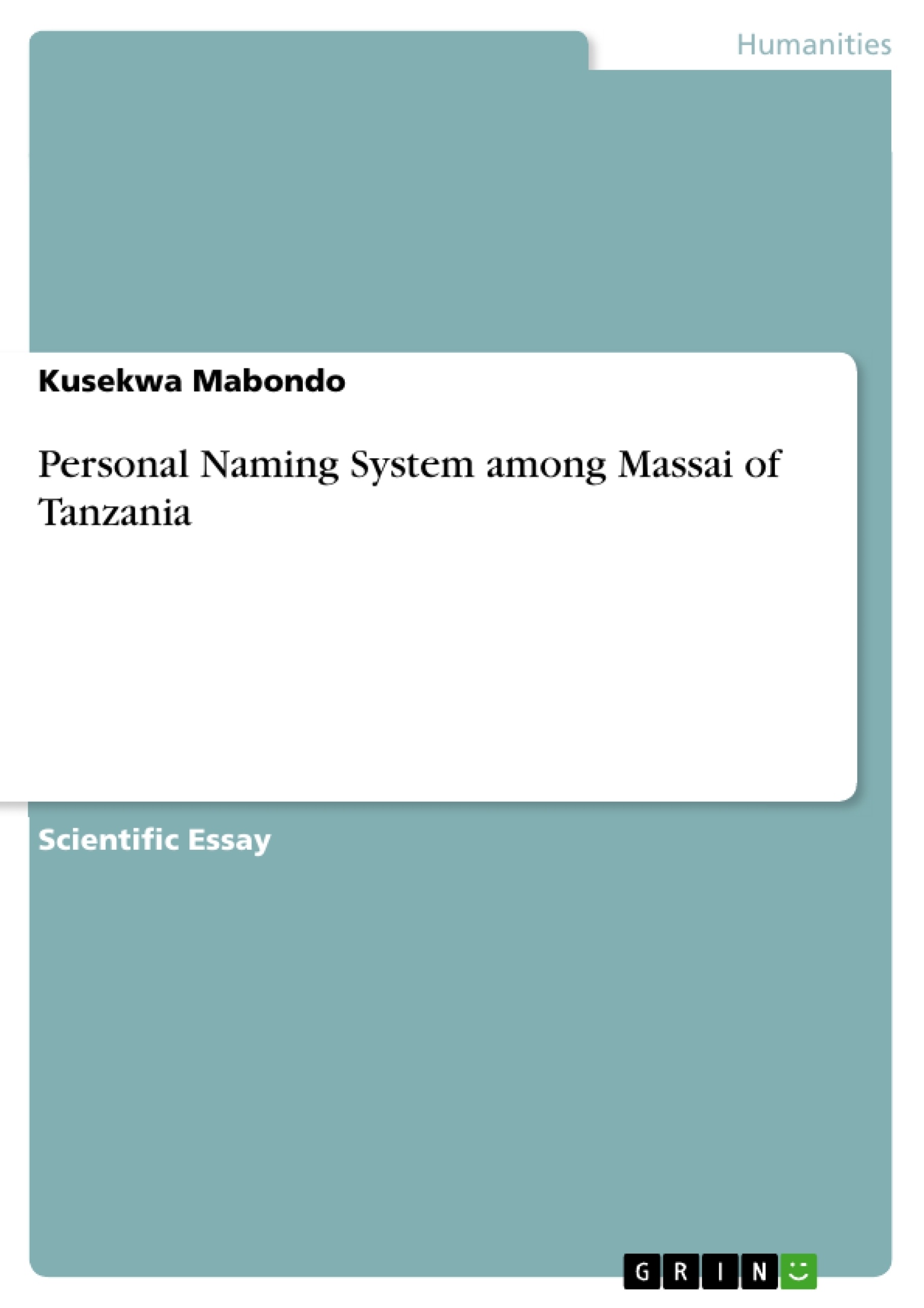The main purpose of this paper is to uncover the meaning and motive behind personal names given to baby born during birth times. This study looks Maasai naming systems not as arbitrary labels but as a linguistic anthropological perspective. Among Maasai in Nothern Tanzania, naming system is socio-cultural interpretation of things, events, and life experiences. It is argued that Maasai personal names are related to power and memory.
Inhaltsverzeichnis (Table of Contents)
- ABSTRACT
- 1.0 INTRODUCTION
- 2.0 THEORETICICAL DEVELOPMENT
- 3.0 METHODOLOGY
- 3.1 STUDY AREA AND TARGET POPULATION.
- 3.2 SAMPLE SIZE AND SAMPLING PROCEDURE
- 3.3 DATA COLLECTION AND ANALYSIS TOOLS.
- 4.0 RESULTS: MAASAI AND NAMING SYSTEM
- 4.1 NAMES RELATING TO EVENTS..
- 4.2 NAMES RELATING TO SITUATIONS.
- 4.3 NAMES RELATING TO TIMES
- 4.4 MAASAI CHILDREN'S NAMES.
- 5.0 DISCUSSION AND CONCLUSION.
Zielsetzung und Themenschwerpunkte (Objectives and Key Themes)
This paper aims to analyze the significance and motivations behind personal names given to Maasai children. The research focuses on understanding the Maasai naming system from a linguistic anthropological perspective, recognizing it as a cultural practice that goes beyond mere arbitrary labels. It examines how naming serves as a reflection of social, cultural, and historical realities within Maasai society.
- The role of personal names in preserving cultural memory and identity.
- The influence of historical events and societal norms on naming practices.
- The connection between names and the expression of power dynamics within Maasai society.
- The sociolinguistic function of names in signifying gender and social roles.
- The impact of colonialism and modernization on traditional Maasai naming systems.
Zusammenfassung der Kapitel (Chapter Summaries)
- ABSTRACT: Introduces the study's focus on understanding the meanings and motivations behind Maasai naming practices, emphasizing its anthropological perspective.
- 1.0 INTRODUCTION: Provides an overview of the Maasai people, their cultural practices, and their history, establishing the context for the study.
- 2.0 THEORETICICAL DEVELOPMENT: Discusses the significance of names and naming in sociolinguistics and explores the historical context of Maasai naming systems, highlighting the influence of colonialism and modernization.
- 3.0 METHODOLOGY: Details the research methods employed, including the study area, target population, sampling procedure, and data collection techniques.
- 4.0 RESULTS: MAASAI AND NAMING SYSTEM: Presents the findings of the study, examining different categories of Maasai names, such as those related to events, situations, time periods, and children's names. This section provides insights into the specific meanings and cultural significance of Maasai names.
Schlüsselwörter (Keywords)
This study centers around the keywords: Maasai, personal names, naming systems, sociolinguistics, cultural anthropology, linguistic anthropology, gender construction, social roles, power dynamics, colonialism, modernization, traditional practices, cultural memory, and societal norms.
Frequently Asked Questions
How do the Maasai choose names for their children?
Maasai names are not arbitrary; they are socio-cultural interpretations of specific events, situations, or times experienced during the birth.
What is the significance of names in Maasai culture?
Names serve as a reflection of social, cultural, and historical realities, often related to power dynamics and the preservation of communal memory.
How has modernization affected Maasai naming systems?
Modernization and colonialism have introduced new influences, sometimes challenging or altering traditional naming practices and their original meanings.
Do Maasai names signify gender roles?
Yes, naming systems often have a sociolinguistic function that signifies gender and specific social roles within the community.
What are "names relating to situations"?
These are names given based on the specific circumstances or hardships present in the family or community at the time of the child's birth.
- Citation du texte
- Kusekwa Mabondo (Auteur), 2017, Personal Naming System among Massai of Tanzania, Munich, GRIN Verlag, https://www.grin.com/document/385895



